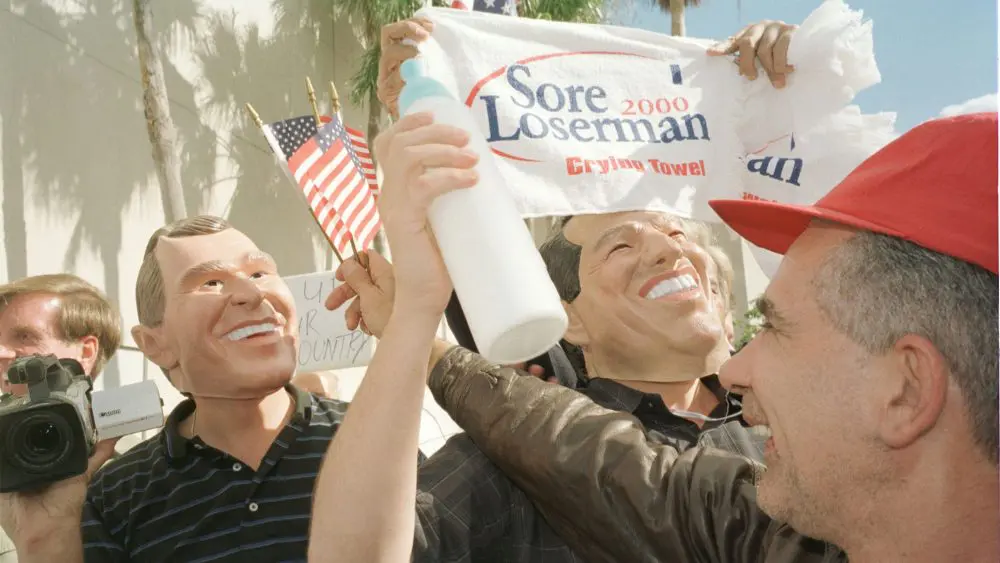The unforgettable recount drama of the 2000 presidential election
A historical political showdown in Florida
On the tense evening of the 2000 presidential election, the showdown between Texas Governor George W. Bush and Vice President Al Gore came to a head in Florida. The results hinged on this single state, and what followed was nothing short of dramatic chaos.
Capturing the crucial moments in film
Director Jay Roach and writer Danny Strong adeptly brought this tension to life in the Emmy-winning 2008 HBO movie Recount, starring Denis Leary, Kevin Spacey, Bob Balaban, and Laura Dern. The film highlighted the fervor of Bush supporters with their rallying cry, not “Stop the Steal,” but “Stop the Recount.”
Reflecting on the film, Roach noted, “The events in Recount were, in some ways, a rehearsal for January 6. It demonstrated the potential to physically disrupt an election.”
A nation haunted by electoral chaos
As America anticipates another heated election night, revisiting the chaos that unraveled over five weeks as Bush and Gore battled over Florida’s vote counting is both eye-opening and crucial. This period’s name was forever etched in history by media outlets with headlines like “Electile Dysfunction,” highlighting the unprecedented and unsettling nature of the crisis.
For many, the legal clash between Bush and Gore a quarter-century ago feels as novel and disconcerting as the political landscape of today. “There have been efforts to undermine our confidence in elections ever since,” echoes Roach, a sentiment that still resonates deeply.
Unfolding the election night drama
Initially, major TV networks prematurely declared Florida for Bush just before 8 p.m. on Election Day, November 7, 2000. This prompted Gore to make the traditional congratulatory call to Bush. However, the night took an unexpected turn as CNN, CBS, and others reversed their stance, briefly calling Florida for Gore. By 3 a.m., Florida was once again deemed too close to call, leading to Gore’s incredulous call to Bush retracting his concession.
Voters woke up to a shocking realization: the anticipated clear victory was anything but. Media giants like Dan Rather, Tom Brokaw, Peter Jennings, and Bernard Shaw admitted their early exit polling datasheets were misleading.
The battle over recounts
From November 8 through December 12, both Bush’s and Gore’s legal teams clashed fiercely over recount procedures in Florida. Prominent figures, like James Baker, the former Secretary of State, spearheaded Bush’s efforts, while Warren Christopher, another former Secretary of State, represented Gore.
“When you want to explore the roots of our current political climate, the 2000 election offers a treasure trove of insights,” says veteran filmmaker R.J. Cutler. Cutler, who directed the landmark documentary on Bill Clinton’s 1992 presidential campaign, observes, “Gore called for letting the process play out, while Republicans began rewriting and exploiting the rules—a tactic that now seems magnified a hundredfold.”
Satire and real-life drama
The recount drama became a daily spectacle of news conferences, each side draped in numerous American flags—a situation hilariously parodied by “Saturday Night Live.” The infamous “Brooks Brothers riot” compounded the chaos, with conservative young men in khakis and button-down shirts disrupting the recount process in Miami with loud protests and physical altercations.
One key issue during this period was the determination of voter intent on tens of thousands of Florida ballots with “hanging chads” (partially punched ballots) or “dimpled chads” (indented but incomplete punches). It was during this chaos that the nation first learned of these terms.
The Supreme Court steps in
The legal wrangling saw decisions bouncing between state and federal courts until December 9, when the U.S. Supreme Court ordered all recounts to cease. Bush was eventually certified as the winner of Florida by a mere 537 votes, securing the 25 electoral college votes needed for victory.
Three days later, the Supreme Court presented its detailed 61-page ruling in Bush v. Gore. Justice Antonin Scalia, concurring with the majority, warned of the dangers of counting questionable votes, stating it threatened the legitimacy of the election. In dissent, Justice John Paul Stevens stressed that the decision would erode confidence in the judiciary, a fear that still lingers.
The legacy and lessons of Recount
With time, Roach and Strong began working on Recount, giving them the necessary perspective to tell this high-stakes, suspense-filled story. They knew the emotional peak would come with Gore’s concession speech, delivered to the nation on December 13, 2000. Despite his disagreement with the Supreme Court’s decision, Gore emphasized the necessity of accepting it for the country’s sake.
“I say to President-elect Bush that what remains of partisan rancor must now be put aside, and may God bless his stewardship of this country,” Gore implored. His call for unity and putting country before party remains a poignant message.
Bush’s own speech that night highlighted a conciliatory approach, hard to envision from today’s more confrontational GOP factions. “Our nation must rise above a house divided,” Bush urged, underscoring shared hopes and values over political discord.
Roach’s reflections on Recount emphasize a crucial aspect of democracy: “Democracy needs losers. When losers don’t concede, the result very often is violence.”
Revisit the mesmerizing political drama of 2000 by diving into Recount and witnessing how these historic events continue to shape our political landscape.
Explore more captivating stories and insights about pivotal moments in political history by following us on social media!

 Italian
Italian







